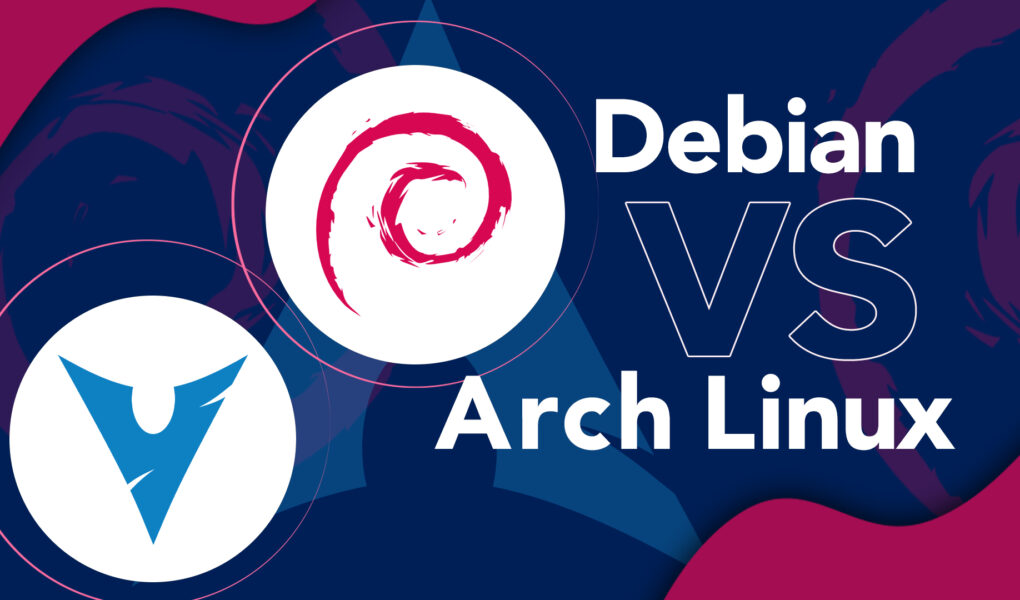Choosing the right Linux distribution can be challenging, especially when comparing two well-established distros like Debian and Arch Linux. After all, you have to pick one, and this is where we all get confused as to which is better.
In this article, we are going to explore the key differences between Debian and Arch Linux to help you decide which one is better for your needs. We will cover their backgrounds, features, pros, cons, and a detailed comparison in various aspects, so you can have a winner.
Debian Overview
Debian is a popular Linux distribution founded in 1993. It is known for its stability, extensive software repository, and strong commitment to free software principles. Debian acts as the cornerstone for many other distributions, such as the widely-employed Ubuntu.
Quick Features
- Stable and well-tested software packages
- Extensive software repository featuring over 50,000 packages
- Long-term support for each stable release
- Extensive documentation and community support
Pros
- Stability: Debian is known for its rock-solid stability, making it an excellent choice for servers, businesses, and users who prioritize reliability.
- Software Availability: With an extensive repository of software packages, Debian offers a wide range of applications and tools.
- Long-term Support: Each stable release of Debian is supported for a long time, ensuring security updates and bug fixes.
- Community: Debian has a sizeable and engaged community of users and developers, offering ample support and resources.
Cons
- Outdated Packages: Due to its focus on stability, Debian sometimes lags behind in terms of the latest software versions.
- Slower Release Cycle: New features and improvements are not released as quickly as in other distributions.
- Less Customization: Debian comes with a more rigid configuration and may not be as flexible as other distributions for advanced users.
Arch Linux Overview
Introduced in 2002, Arch Linux is a lightweight and adaptable Linux distribution. It adheres to the (Keep It Simple, Stupid) principle and is designed for users who want to build their system from the ground up.
Quick Features
- Rolling release model for up-to-date software packages
- The minimalist base system for maximum customization
- Extensive documentation in the ArchWiki
- Active and knowledgeable community
- AUR (Arch User Repository) for user-contributed packages
Pros
- Latest Software: Arch Linux’s rolling release approach guarantees users can access the most recent software editions.
- Customization: Arch Linux provides extensive customization options, enabling users to shape their systems according to their preferences.
- Documentation: The ArchWiki is an extensive resource for learning about and troubleshooting Arch Linux.
- AUR: The Arch User Repository offers a vast selection of user-contributed packages, expanding software availability.
Cons
- Less Stable: Arch Linux can be less stable due to its rolling release model and the use of cutting-edge software packages.
- Higher Maintenance: Arch Linux requires more hands-on maintenance and configuration compared to other distributions.
Debian vs Arch Linux
1: Stability
Renowned for its reliability, Debian is a superb selection for servers and mission-critical applications. On the other hand, Arch Linux’s rolling release model and cutting-edge software may result in less stability, particularly for inexperienced users.
2: Software Availability
Both Debian and Arch Linux have extensive software repositories. Debian’s official repository contains over 50,000 packages, while Arch Linux’s AUR expands its software availability even further. However, Arch Linux generally offers more up-to-date software due to its rolling release model.
3: Installation and Configuration
Debian’s installation process is more straightforward and user-friendly, with pre-configured packages and settings. Arch Linux, following the KISS principle, requires users to build their system from scratch, offering more customization but also a steeper learning curve.
4: Community Support
Both distributions have large, active communities. Debian’s community is known for its extensive documentation and commitment to free software principles, while Arch Linux’s community is known for its technical expertise and the ArchWiki.
5: Performance
Arch Linux’s minimalist design and up-to-date software can result in better performance for some users. Debian’s focus on stability and long-term support may mean sacrificing some performance improvements in favor of reliability.
Which is better for you?
Choosing between Debian and Arch Linux ultimately depends on your preferences, experience, and use case. If you prioritize stability, long-term support, and a user-friendly experience, Debian is likely a better choice for you. If you prefer customization, up-to-date software and are willing to invest time in learning and maintaining your system, Arch Linux may be the better option.
Conclusion
Debian and Arch Linux are exceptional Linux distributions, each possessing distinctive characteristics and communities. While Debian focuses on stability and long-term support, Arch Linux emphasizes customization and cutting-edge software. Carefully consider your needs, preferences, and experience when choosing the right distribution for you.



